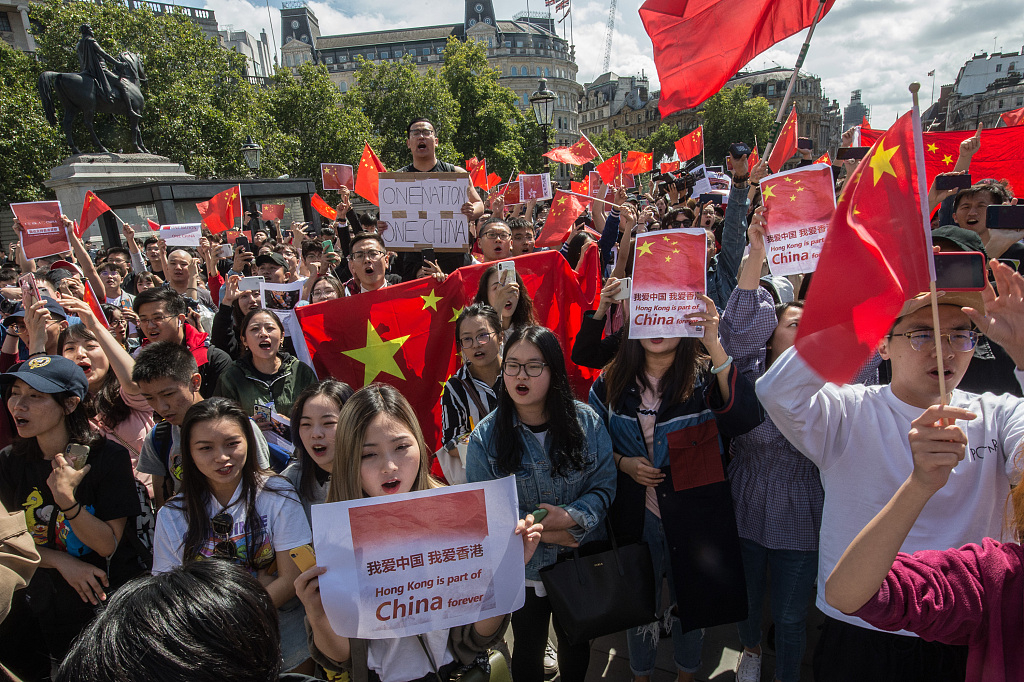
Editor's Note: Tom Fowdy is a British political and international relations analyst and a graduate of Durham and Oxford universities. He writes on topics pertaining to China, the DPRK, Britain, and the United States. The article reflects the author's opinions and not necessarily the views of CGTN.
As the "China threat" hysteria sweeps over Australia, one "Anglosphere" nation that has been largely measured in its approach is the United Kingdom. While Washington and Canberra have collectively lost their minds over China, London has sought to keep the door open to Beijing. In the past year alone, the UK has shown a marked tolerance for Huawei, a disapproval of the trade war and a continued appetite for Chinese investment.
Although it is true to say that some have sought to make that "shift" as seen in those countries, such as within the government, anti-China sentiment in Britain has not yet materialized at a policy level. With the United Kingdom not being based in the Pacific, and all the country's political and foreign policy energies being vested towards Brexit, China has remained a background issue in everyday discourse and conversation at best.
This does not mean, however, that some actors will stop trying. Several days ago, the British newspaper The Times published an inflammatory report with an extremely provocative artwork of Chinese female soldiers as graduates, making the claim that Britain was letting thousands of Chinese spies into the country through its cohort of international students. Similarly, other right-wing newspapers such as the Daily Telegraph have also sought to sharply attack UK universities for "relying on China" and thus not coming to the aid of Hong Kong students in campus disputes with Chinese mainland residents.
The demonization of Chinese students is a slippery slope for Britain; one which, if not resisted, will pose significant risks to the country's economy and educational competitiveness. In the midst of Brexit and anti-immigration sentiment, the government has already put the huge cohort of EU students in jeopardy and is likely to reduce their numbers over time.
In turn, a growing scapegoating of Chinese students, a rampant trend in the United States and Australia, will be an erroneous and self-destructive move which will deepen the country's diplomatic isolation. Britain must be a voice of reason here.

Chinese overseas students voice opposition against Hong Kong rioters in London, the United Kingdom, August 17, 2019. /VCG Photo
Chinese overseas students voice opposition against Hong Kong rioters in London, the United Kingdom, August 17, 2019. /VCG Photo
As The Times report pointed out, there are over 100,000 Chinese international students in the United Kingdom. This is not a figure to be worried about, but a figure to be proud of. These students have to pay more than the locals. In turn, they bring money and jobs into the country which allows Britain to sustain some of the world's leading universities and research achievements.
The growing cohort of international students has injected new momentum into areas of the country that are suffering from post-industrial decline and unemployment, including Sunderland, Newcastle Upon Tyne, Liverpool, Sheffield and many more like it. The idea that their contribution can be written off or to smear them as spies or infiltrators is shocking at the very least, and a chronic exaggeration, which stems from a failure to understand their perspectives, especially on matters such as Hong Kong.
The temptation to demonize, generalize and scapegoat has consequences. In the United States, a recent report found that 87 percent of Chinese are reconsidering their plans to study in the country because of the political atmosphere against them. With Chinese students adding 8 billion U.S. dollars a year to the U.S. economy, this will hurt.
As it already stands, Britain is in a much weaker position. Pending withdrawal from the European Union means that new barriers may be imposed for European students studying in the UK. Obsessed with immigration reduction targets, the UK government has sought to tighten student visa policies. Subsequent uncertainty over Brexit and thus the potential cut down of European research ties has already damaged the international rankings of British universities.
In this case, the idea that Britain can shut out Europe and then China out of its educational system is a catastrophe in the making. A toxic atmosphere akin to the U.S. and Australia will damage the country's good name and deepen its diplomatic isolation. The UK simply cannot afford to shut the door on two of its largest benefactors and also sustain a world-class university system.
Therefore, it is Britain's responsibility to hold firm as a voice of reason and tolerance and to avoid going down this path at all costs. The report in The Times must be condemned swiftly and decisively for its Sinophobic and paranoid undertones. Demonizing Chinese students puts Britain's educational and economic systems at risk. Instead, it should find it a privilege that many of China's brightest and best continue to choose to study in the UK, contributing to the country and its well-being.
(If you want to contribute and have specific expertise, please contact us at opinions@cgtn.com)